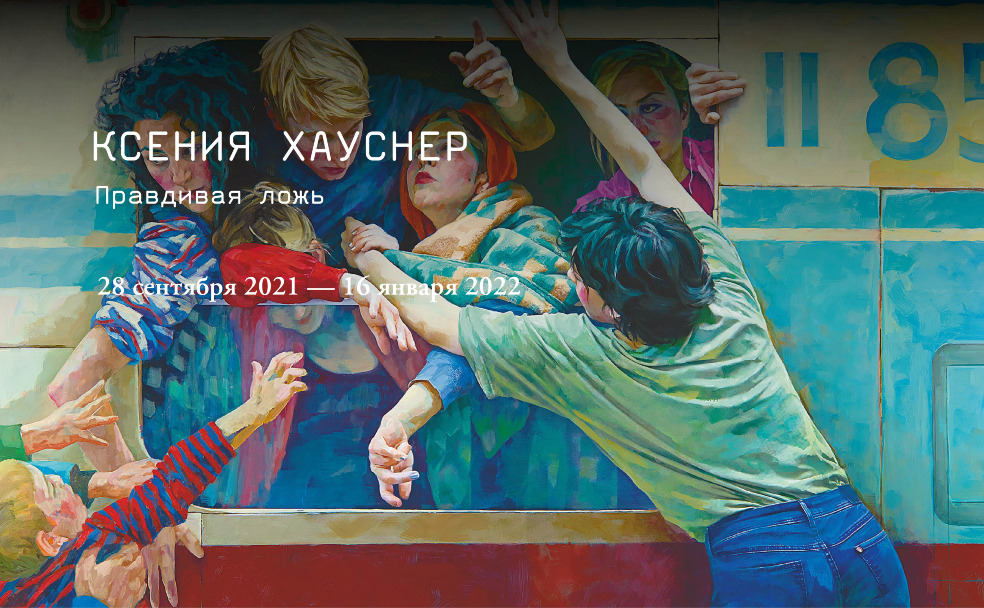The exhibition Xenia Hausner: True Lies will open on 28 September at the Gallery of 19th and 20th Century European and American Art at The Pushkin State Museum of Fine Arts. Visitors will get to see a total of 30 paintings by Xenia Hausner and a series of photographs made by the artist in preparation for her painted works.
Xenia Hausner was born into an artist’s family in 1950, studied stage design in Vienna and London, and began creating set designs for plays and operas in 1977, working with the most prestigious venues in the world from the Royal Opera House Covent Garden to the Salzburg Festival.
In 1992, the artist decided to devote herself exclusively to painting. This was motivated by her desire to gain more freedom and become the ‘director of her own painterly productions’. The theatrical and, more generally, narrative dimension of Hausner’s work shows her to be the inheritor of a centuries-long tradition of Western European painting. At the same time, her art is targeted at the present day, depicting contemporary character types and treating current societal problems. Her dramatic, colourful and emotionally charged works leave no one indifferent, convincingly showing that the potential of figurative painting is far from exhausted today.
In most of Hausner’s paintings, the action takes place in a theatrical setting with meticulous staging, arranged lighting, and decorative backdrops, where models play out roles in mysterious and ambiguous mise-en-scènes. The very title of the exhibition points to the importance of theatrical principles in the artist’s work: the arranged, the invented and the fictitious turn out to have a truthful inner content that evokes the viewer’s immediate reaction.
In Xenia Hausner’s work, everything is designed to intensify the viewer’s experience – a task previously pursued by several generations of 20th-century painters. The artist attains this goal thanks to her vivid palette, sweeping brushstrokes, ornamental motifs and decorative designs, which are further enhanced by large formats and powerful and monumental figures that place her work in the tradition of altarpieces, historical paintings and state portraits.
One of Xenia Hausner’s key themes is the role of women in life and art. The action of her paintings takes place in a certain alternate reality dominated by women, who play the main role in the artist’s settings. Far from imposing themselves, the rare male characters blend organically into the ‘female world’ of her paintings.
‘My universe is female. Women are a pivotal element in my work. In my pictures they act as representatives of all genders. I process the human themes with a female cast.’ Xenia Hausner
Hausner’s paintings are capable of generating ever new meanings in the individual viewing experience. The artist also expands the associative field through her use of titles from both well-known and relatively obscure films and books, which provide additional food for thought for viewers in the know. More often than not, the plots and characters of these works bear little relation to what is taking place in the artist’s paintings. Hausner makes use of the method of free association when choosing her titles that are, first and foremost, poetic metaphors. In addition, she often refers to both individual works by other artists and general styles of painting. In any case, reading a specific reference does not provide the viewer with an instant solution but only helps him or her to find one of many possible vectors of interpretation.
‘I don’t offer an instruction manual or reading guide. On the contrary. Unambiguous interpretations are boring. Life is a question mark. Art has to be mysterious, nonconformist, and irrational.’ Xenia Hausner
The desire to find a connection with the viewer, to be open to him or her, is the most important aspect of Xenia Hausner's work. At the same time, the ambivalence of many of the scenes staged by the artist makes the viewer take an active stance with regard to her paintings and compare them with his or her own life experiences, fears and desires.
Hausner’s art has a profound impact at both visual and emotional levels: the viewer is caught up in the drama of an intense and, at the same time, highly intimate and profound contact between human beings. The artist has a special gift for bringing across subtly orchestrated emotional links between the main characters of her paintings, whose main themes are human relations and manifestations of care, affection and love. This explains the profound importance of her work for today’s world marked by an unending pandemic, continuing local and global conflicts, and the appearance of ever new waves of refugees.
Curators: Daniel Bulatov and Elsy Lahner (Vienna)
Xenia Hausner’s retrospective is held in cooperation with The Albertina Museum Vienna and with the support of the Austrian Federal Ministry for Arts, Culture, Civil Service and Sport.









